Top Drupal Modules and Features for A Compelling Event Section
Events are more than just dates on a calendar. They’re opportunities to build trust and visibility for your brand, educate and inspire your audience, and spark meaningful actions like registrations, donations, or follow-ups. Whether in higher education, nonprofit, government organizations, or beyond, events play a vital role in advancing your mission.
If you’ve ever organized an event, you know how many moving parts need to align. One powerful ally in making it all come together? A strong online presence — a space where your audience can discover your event and instantly think, “Yes, this is for me.”
With Drupal, you can showcase your events clearly and compellingly — and manage them with ease. So if you plan to create an event section or enhance an existing one, this article is for you. Explore what Drupal has in store to make your events well-organized, visually engaging, and packed with smart features for both visitors and editors.

Top Drupal modules and features for creating an event section
A consistent structure and look
Let’s start with one of Drupal’s core strengths: its flexible content type system. With it, you can create a dedicated Event content type to store and manage all your events in one place. Each entry follows the same structure and formatting, giving you consistency, clarity, and control.
Your Event content type can include any combination of fields that suit your needs:
- title
- body text
- cover image
- start and end date/time
- location
- contact email
- telephone number
- any additional custom fields specific to your setup
Drupal gives you full control over your content layout. You decide which fields appear, in what order, and how they’re displayed. For example, you can position an event’s main image below the title or the description, make it large or compact or skip it altogether if images aren’t needed.
Furthermore, you can configure the same image to be displayed as a hero banner on a full event page and as a tiny thumbnail in the event calendar. All a content manager needs is to create an event just once — and Drupal takes care of the rest.
Classifying and categorizing your events
The more events you have, the more important it is to keep them organized — and it’s easy thanks to the Drupal taxonomy system. It helps you categorize events based on certain criteria, for example:
- Event type (Conference, Workshop, or Meetup)
- Target audience (Students, Alumni, or Volunteers)
- Location (New York, Online, or EU Region)
Next, by adding these taxonomy fields to your Event content type, you make sure each event item can fall under certain categories as defined by the content editor.
Flexible event collections and smart filtering
Event categorization opens the door to powerful filtering options — but let’s start with the core tool that powers it all: Drupal Views.
Views let you display events in any format: a grid of upcoming sessions with eye-catching images, a clean list of past events, and so on. You can also create calendars with the help of additional modules (more on that shortly). The key is: you control what shows up and how it’s displayed.
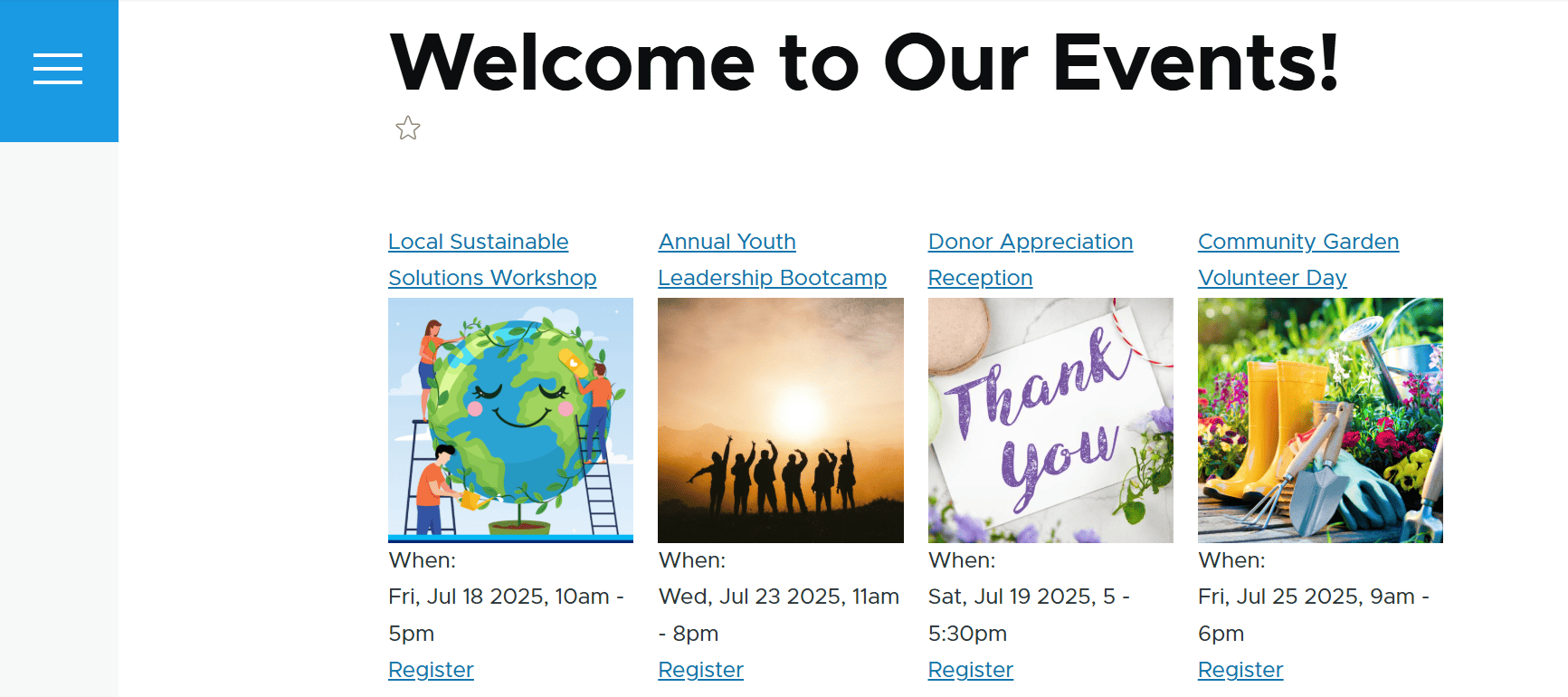
If your events are categorized using taxonomy, you can use this to filter a collection so it shows only events of the specific location, audience, type, and so on.
Furthermore, you can make the filters “exposed” (open to visitors) and give them the reigns to search for the events they want. This includes search by categories, typing in keywords to search by title, and many other possible setups with filtering and sorting. It’s a great way to make your events more discoverable and your site more user-friendly — especially as your calendar fills up.
Besides these basic and simple features, you can discover more about what Drupal Views can do for presenting your event collections based on any requirements.
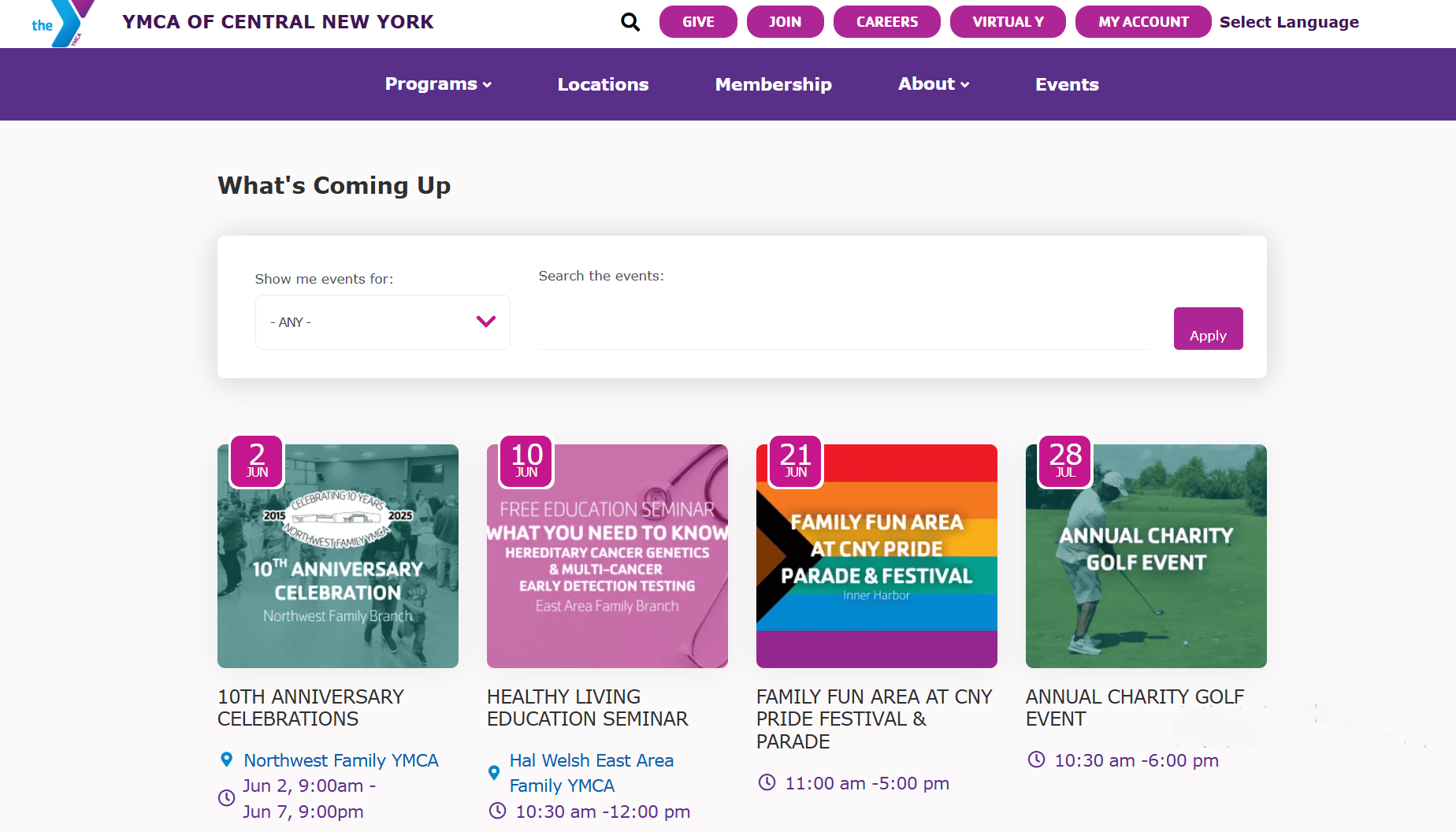
Search and filtering for complex event collections
For simpler use cases with fewer events, Views filters work great, but for larger or more complex event collections, you can boost your search more substantially. The Search API and the Facets modules give you a faster and more flexible way to help visitors find what they need.
With this setup, your events are indexed — meaning Drupal can respond to searches and filters more quickly, even if you have thousands of entries. You can let users combine multiple filters (like topic + location + date) and search by keyword at the same time.
Facets make it easy to build an intuitive filtering sidebar with checkboxes, sliders, or dropdowns. And with optional features like autocomplete and sorting, your event section becomes more interactive and user-friendly.
Advanced event date and time management
The most essential information about an event includes its date and time. Besides the built-in fields for it, there is an add-on tool in Drupal that offers you a more advanced and user-friendly approach to date and time management. It has especially flexible settings and efficiency-enhancing features.
The tool is called the Smart Date module, and here is what you can do with it:
- display the date and time in any format you like
- set up the default event duration that will be assigned to new events automatically
- have the end time of events auto-populated
- create multi-day events
- create zero-duration events
- create recurring dates (thanks to the Smart Date Recurring submodule)
- define the specific timezones
- and more

Managing recurring events
You can create events that repeat on your schedule — daily, weekly, monthly, or in any custom pattern you need. Just set up recurring events once and have Drupal handle the rest, with no need to manually recreate events every time.
While the Smart Date Recurring submodule does a good job with that, the Recurring Events module is an even more robust and extensible tool. Each repeating event in a series is treated as its own item, so you can easily tweak dates or remove individual instances without affecting the whole group.
This module has helpful extras:
- registration support so users can sign up for events (or entire series)
- reminder emails to keep attendees informed
- integration with Views so you can list and filter recurring events your way
- support for the Group module to organize events within communities or departments
Creating event calendars
Event calendars offer an engaging way for users to discover your events. Drupal has some great modules for creating event calendars via Views such as Fullcalendar View, Calendar View, Calendar, FullCalendar, and more.
We offered a detailed step-by-step guide to creating calendars with two great modules — Fullcalendar View and Calendar View. In a nutshell, here is what you can expect from these tools:
- Fullcalendar View
The Fullcalendar View module lets you build rich, interactive calendars using the powerful FullCalendar JavaScript library. It supports day, week, and month views, and offers features like:
- creating events by double-clicking
- editing directly within the calendar
- drag-and-drop rescheduling
- color-coding by event type
- support for multilingual content
- and optional support for recurring events
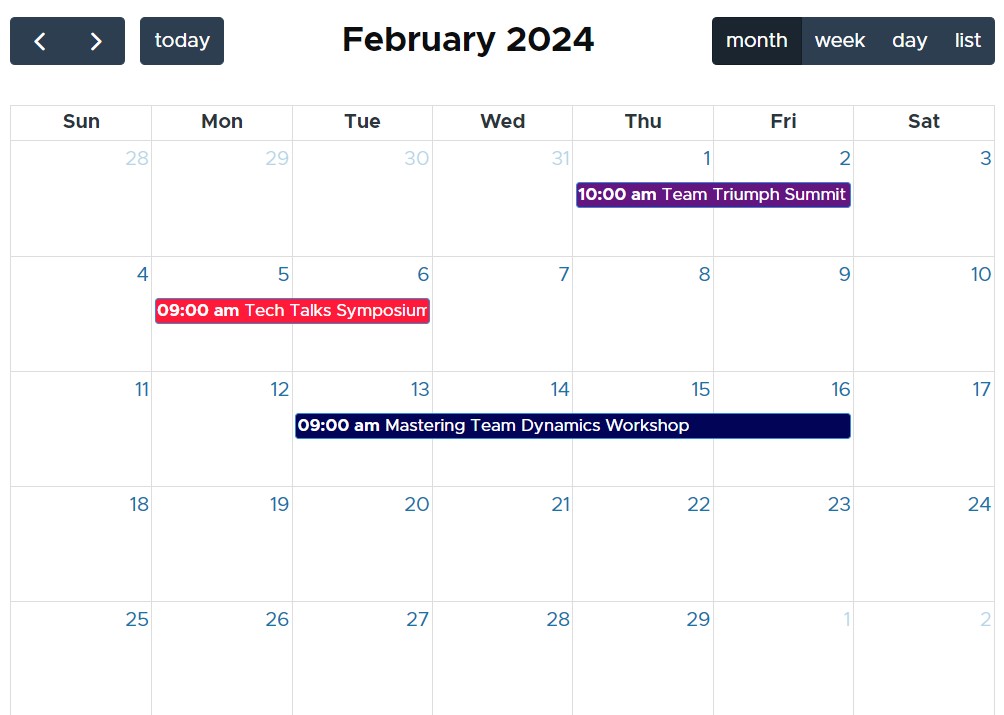
- Calendar View
The Calendar View module is a lightweight alternative for displaying events in monthly or weekly calendar layouts. It uses AJAX navigation for seamless browsing between timeframes and supports:
- tooltips on hover to preview event details with the Tooltip module
- integration with Smart Date for advanced date handling and recurrence
- and compatibility with Bookable Calendar if you need reservations or availability features
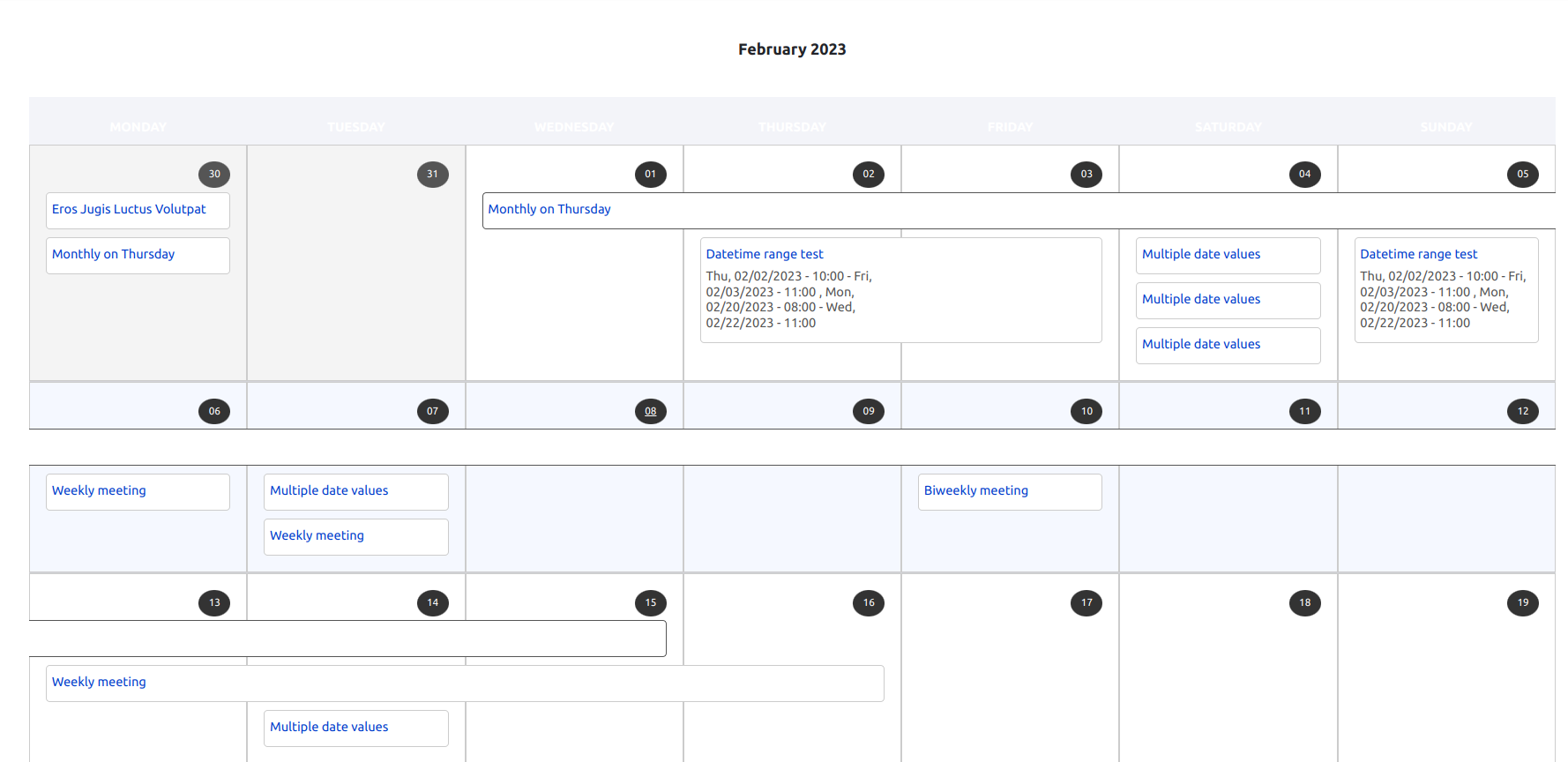
Putting your events on the map
Want to help users find events near them at a glance? Maps add a dynamic, visual layer that makes exploring your events easier and more engaging. And there are great tools for adding a map to your Drupal website.
The Simple Google Maps and the Google Map Field modules will help you add one of the most popular types of maps, Google Maps, to your events. With modules like Geofield or Geolocation Field, you can store precise location data for each event. The Geofield Map module builds on Geofield by adding interactive tools such as a location picker widget, dynamic map rendering, and more. You can display the maps beautifully using modules like Leaflet which relies on a JavaScript library to create maps with tooltips, popups, and more.
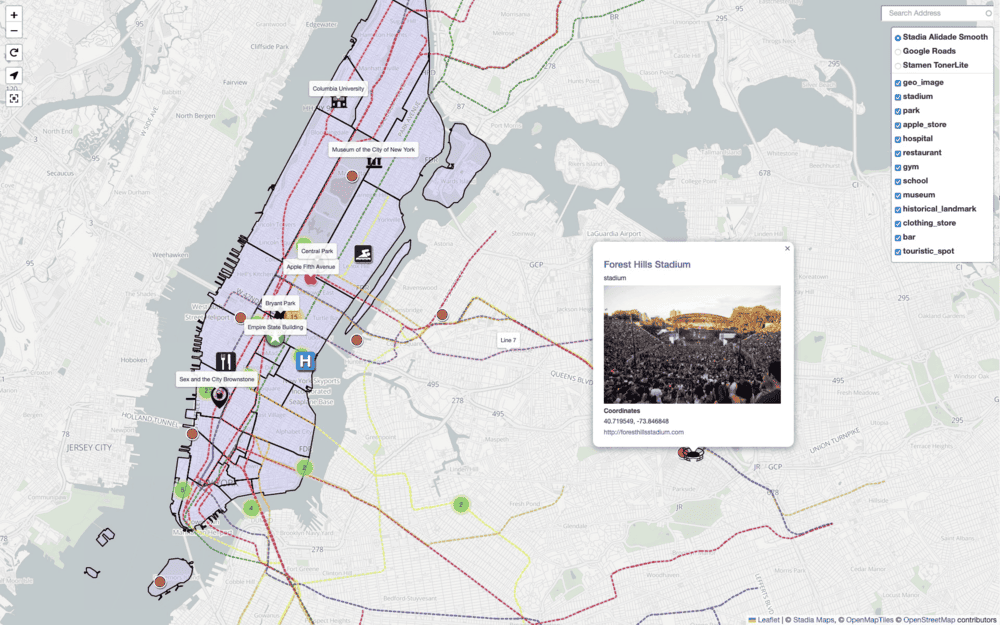
Keeping everyone in the loop with notifications
Timely updates make all the difference when it comes to events — and Drupal has you covered. You can automate the sending of confirmation emails after registration, reminders before the event, or notifications about any changes. Modules like Recurring Events Reminders (a submodule of Recurring Events) let you schedule reminder emails. Message lets you create custom notification templates and send them based on specific actions (like registration or cancellation).
You can also use the Mailchimp module for managing email lists and sending email campaigns from your site, the Campaign Monitor module to allow users to subscribe and unsubscribe for your campaign, and the Mailchimp Transactional module for transactional emails.
The ECA (Event-Condition-Action) module is a new and extremely powerful Drupal tool that can be configured to trigger notifications in various scenarios.
Easy event registration and booking
Drupal offers flexible tools to collect attendee signups with ease. Here are a couple of great examples.
The Entity Registration module is designed for allowing and tracking user registrations for events. It offers lots of features like the option to restrict the number of registrations, collect information like T-shirt sizes or dietary preferences, set registration open and close dates, automatically send messages, and more.
The module integrates with ECA for automated workflows. For paid or ticketed events, you can use it in combination with Drupal Commerce.
You can enable users to reserve their seats at your events via the Bookable Calendar module. It seamlessly integrates with the Calendar View and the ECA modules.
Importing and sharing events
Need to bring events in from other systems or keep calendars in sync? It’s possible with Drupal. Use modules like Feeds or Migrate to import events from CSV files, Google Calendar, or external feeds — perfect for syncing with partner organizations or pulling from centralized sources.
Want to share your own calendar? Drupal can generate iCal and RSS feeds from your event listings using Views and modules like Date iCal. iCal (short for iCalendar) is a universal calendar format supported by tools like Google Calendar, Apple Calendar, Outlook, and more. When someone subscribes, your updates automatically appear in their calendar — no manual updates are needed.
Automatic event publishing and unpublishing
With the Scheduler module, you can set a publish and unpublish date and time for each event. It’s perfect when you want it to automatically go live at a specific date and disappear once it’s over. It’s especially helpful for events with a clear start and end window.
Scheduler does regular publishing or clean-up of all scheduled events with the help of a special automation tool — Lightweight Cron. The tool follows the principle of work of Drupal’s automated task runner Cron but, as the name suggests, has a more lightweight approach. This means it performs not all scheduled tasks across the entire website but only those specific to Scheduler.
Fully pre-configured events with Recipes
There’s an even easier way to kick off your event section: Drupal Recipes — fully pre-packaged feature sets that bundle content types, fields, Views, and configuration. One of the first and most widely adopted of these is the Event recipe, built and refined by the Drupal community.
The Event recipe comes included with Drupal CMS (Starshot) — the new, streamlined version of Drupal focused on out-of-the-box usability. Fully pre-configured events are one of its standout features. You can enable them during the installation process with a single checkbox — or add them later at any time.
No setup is needed — you can start creating events right away. There’s a ready-to-use Event content type with essential fields like date, time, and even a map for event locations, plus sample events to help you get started. A pre-built calendar view is also included out of the box.
The best part? Recipes aren’t exclusive to Drupal CMS. You can install the Event recipe on standard (“classic”) Drupal too, starting with version 10.3 and above. While the process is currently a bit more hands-on than in Starshot, it brings the same functionality to your site.
Final thoughts
Drupal gives you everything you need to build an event section that’s engaging, interactive, and easy to manage. The features outlined above are just a glimpse of what’s available either out of the box or through ready-made add-on modules. And if you’re looking to go beyond the basics, a professional Drupal team can help you tailor and enhance your setup so your event section truly brings your vision to life.




